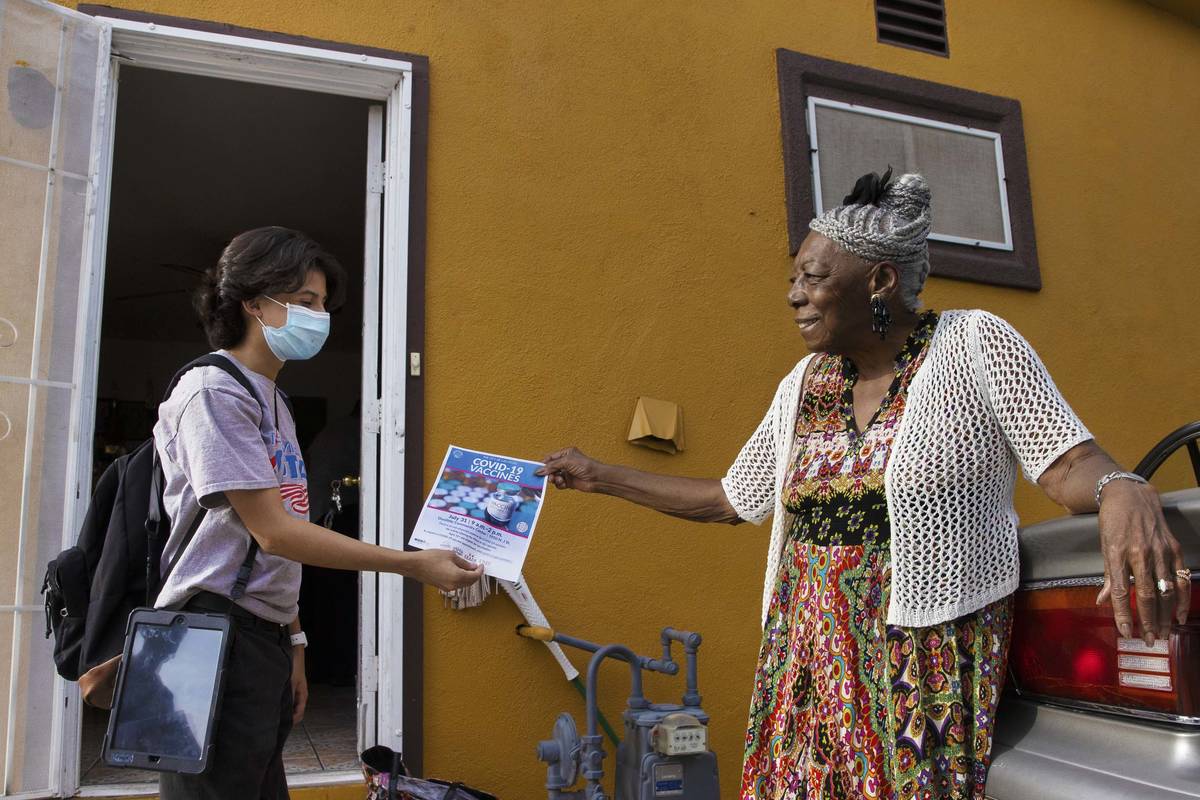Latino voter registration group segues to vaccination outreach

When 17-year-old Jacinto Alfaro knocks on doors to spread information about COVID-19 vaccination, he often encounters hesitancy to get the shot.
That can take different forms, said the volunteer with the Mi Familia Vota community organization in Las Vegas. Some residents are curt, while others are confused why a teenager is on their front porch with a stack of flyers. Others choose to not answer their doors or merely look at him through the window.
That hasn’t stopped Alfaro from walking the blocks of impoverished and heavily Hispanic neighborhoods for the last two months to spread the word about vaccination and encourage residents to get the shot or shots that are the best protection against the disease caused by the coronavirus.
“I just want to help my community,” said Alfaro. “I know a lot of minorities don’t usually get the information that they need.”
Mi Familia Vota’s canvassing effort is separate from a push by state and local governments, with support from the Federal Emergency Management Agency, to increase vaccination rates in communities where vaccine hesitancy is common. That includes door-to-door canvassing in areas where disease transmission is high, often by volunteers from community groups enlisted to help spread the word.
First registration, now education
But the effort by Mi Familia Vota, a nonprofit organization with local chapters around the country, grew out of its work sending teams out to register voters in Latino neighborhoods. But instead of using voter registration data to pick their targets, organizers comb through online data to find which ZIP codes have the lowest vaccination rates.
But more important than picking the right ZIP codes is picking the right messengers, said Maria Nieto Orta, the Nevada coordinator for Mi Familia Vota. Unlike other vaccination efforts led by state or local city officials, the group deploys bilingual people familiar with the neighborhoods. They help set up appointments, offer rides to pop-up vaccination events and answer any questions.
“We are making sure to talk to people in the language they feel comfortable in, especially with such important information like the one we’re giving out,” said Orta.
The face-to-face outreach is particularly helpful in reaching people who remain reluctant to get immunized. Orta said some undocumented Latinos are misinformed that they may be reported to immigration authorities. And younger Latinos often are influenced by social media or won’t receive a shot unless their parents get vaccinated first.
“A lot of people don’t understand,” said Orta. “They’re afraid and it’s about telling them your personal experience with the vaccine and this is why it’s important you do it.”
Hispanics make up about 31.1 percent of the population in Clark County, according to U.S. Census Bureau data, and as of Thursday accounted for 32.9 percent of vaccinated residents, according to the Southern Nevada Health District. But that only tells part of the story. As of Thursday, the rate of COVID-19 cases among the county’s Hispanic population was 11,597.4 per 100,000 residents, far higher than any other ethnic or racial group in the valley, according to health district data.
Alfaro, a senior at Canyon Springs High School, said he was reluctant to get a shot as well, having heard from his father that the vaccine was created for “political reasons.” But after educating himself and deciding to get immunized, Alfaro has helped his parents and sister set up vaccine appointments.
‘I don’t want to get COVID anymore’
From conversations he has had over the last two months he has been volunteering in the door-to-door effort, Alfaro says most people cite transportation and fear of missing work as the main reasons for not yet being vaccinated.
His aunt had a similar argument until she contracted COVID-19 and was forced to call in sick for her job for weeks. After recovering, she received her first shot at a Mi Familia Vota event last weekend.
“She said, ‘I took the shot because I don’t want to get COVID anymore,’ which is a simple reason, but a honest reason,” Alfaro said.
During Thursday’s canvassing effort near Doolittle Park, Alfaro once again faced many unopened doors. A handful of people grabbed the flyer with just a head nod or “thank you.” Others, like 90-year-old Lucille Bryant, who is vaccinated, took the flyer so she could give it to a family member.
Before closing her door, Bryant, who has five children, 19 grandchildren, 32 great-grandchildren and 35 great-great-grandchildren, thanked Alfaro and gave him a message to pass along to her neighbors.
“Please get it, help protect us; we’re trying to protect you,” Bryant said.
Contact Mathew Miranda at mmiranda@reviewjournal.com. Follow @mathewjmiranda on Twitter.